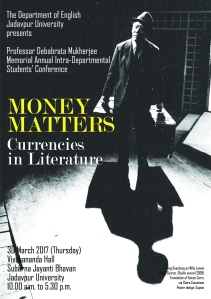 The theme for this year’s Prof. Debabrata Mukherjee Memorial Intra-Departmental Students’ Conference is Money Matters: Currencies in Literature.
The theme for this year’s Prof. Debabrata Mukherjee Memorial Intra-Departmental Students’ Conference is Money Matters: Currencies in Literature.
We invite 1000-word papers (or versions thereof) from students who presented and from those whose papers we were unable to accommodate on the theme. The concept note is re-published below for reference.
You may send your papers to jude.livingontheledge@gmail.com.
“Others will dream that I am mad, and I [will dream] of the Zahir. When all men on earth think day and night of the Zahir, which one will be a dream and which a reality, the earth or the Zahir?”
– Jorge Luis Borges, “The Zahir”
Faustus paid for his knowledge with his soul and Dorian Gray bought youth with his. Human interactions in the social, economic, moral/ethical, and political spheres almost invariably involve some kind of exchange. In Georg Simmel’s classic study of the social implications of the money economy as a site of modernity, The Philosophy of Money, monetary currency is seen as the ultimate mediator, separating the consumer from the object of value, while acting as a bridge between the two by making that value quantifiable. Recently, Nigel Dodd has drawn our attention to ‘the social life of money’, gesturing towards the social relations that are formed between its users.
This students’ conference invites papers on the topic of monetary and other exchange systems in literature and other cultural texts. Papers may pertain to the cultural representation of money–in the form of exchange, opulence, insignificance; or to the circulation of value within texts in the form of money or other kinds of social currency. The acute awareness of the limits of the economic framework within which a given culture lives, thrives, or declines is manifested not only in the literary text but also in the processes through which literary artefacts are produced, disseminated, consumed, preserved, or destroyed. Therefore, papers might also wish to consider material aspects of literacy, book publishing and topics that are, so to speak, external to the world of the text.
Topics may include but need not be restricted to:
• Value of labour
• Capital, borrowings, debt
• Socio-economic stratifications
• Exchange, gifts, alms
• Kinship, inheritance, endowments, loss
• Literary speculation about money
• Geopolitical space and money
• Money, crime, violence
• Literature and the market
• Colonialism and traffic
• Insignificance or absence of money
• Monetary circulation and access to reading
• Poverty and childhood